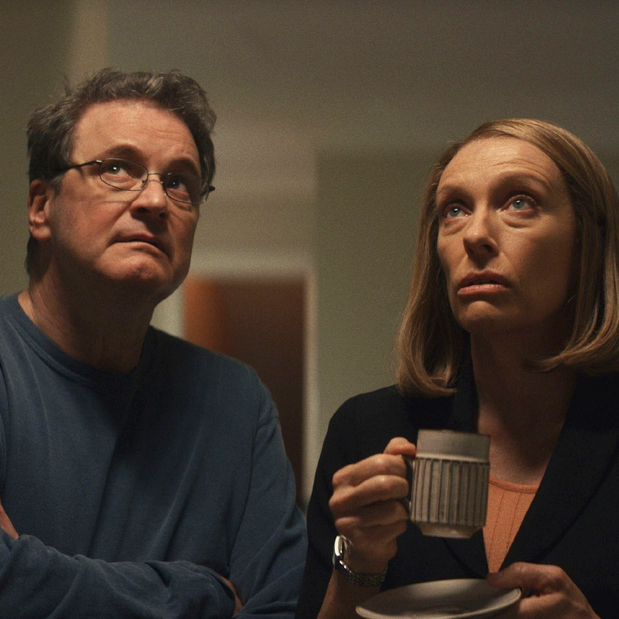When the French director Jean-Xavier de Lestrade set out to make a hit true-crime documentary, he had no idea that the story he chose — about the death of Kathleen Peterson in a big house in the American South and the trial of her husband, Michael, for murder — would still be fascinating people 20 years later.
His factual film, which first came out in 2004, has now been adapted into a hit drama of the same name, The Staircase, starring Toni Collette and Colin Firth. De Lestrade’s actions are the ones now under examination — and he feels betrayed.

Michael Peterson is a former army captain and author, Kathleen was a telecoms executive, and the couple lived with their family — children from previous marriages and two adopted girls — in a sprawling mansion in Durham, North Carolina, with large grounds and a swimming pool. They appeared to have a perfect marriage — until the night Kathleen was found dead at the bottom of the staircase.
De Lestrade, now 58, gained extraordinary access to the events that followed — when the post mortem examination showed seven lacerations on Kathleen’s scalp, which the prosecution argued were the result of a beating; when the details of Michael’s liaisons with male escorts began to emerge; and finally, when the body of a family friend, Liz Ratliff, was exhumed. Ratliff had also died at the bottom of a staircase in 1985, supposedly after a hemorrhage — the Petersons went on to adopt her daughters — and Michael Peterson was the last person to see her alive. The new examination of the body revealed that she too had been murdered.
“There is no such thing as a staircase killer who strikes every 20 years,” Michael Peterson’s furious lawyer declared. Nevertheless, Peterson was found guilty of his wife’s murder. He served eight years of a life sentence before it emerged in 2011 that a supposed blood expert had fabricated evidence and lied under oath. Before his retrial, Peterson signed an “Alford plea” — acknowledging there was enough evidence to convict him of voluntary manslaughter but not admitting his guilt — and was freed based on time served.
Peterson is a compelling antihero. He appears to be a fragile narcissist, a man who falsely claimed to have been injured in Vietnam (rather than in a traffic accident). In one episode of de Lestrade’s documentary, he says: “[The prosecution] think they know the truth. David, my defense lawyer, believes he knows the truth, but the truth is lost.”
And the story has been further muddied by the new drama, on Sky Atlantic and Now TV, which raises ethical questions about de Lestrade and his film crew — which the director strongly denies.

The drama suggests that Peterson had an affair with Sophie Brunet, an editor on the original documentary. Brunet did start a personal correspondence with Peterson, de Lestrade says, but not until after she had left the documentary project, a few weeks before the verdict of the trial was announced. Brunet and Peterson wrote to each other while he was in prison, says de Lestrade, but only met and began a relationship after his release in 2011.
The other suggestion in the drama is an even more damaging one. A spoiler alert here: in episode five — not yet available in the UK — de Lestrade and his team are shown editing footage to try to sway the outcome of an appeal in 2006 against Peterson’s life sentence.
“There is no such thing as a staircase killer who strikes every 20 years,” Michael Peterson’s furious lawyer declared. Nevertheless, Peterson was found guilty of his wife’s murder.
De Lestrade was furious when he saw the episode. “I couldn’t believe it, it was so inaccurate.” He felt betrayed by the director of the drama, Antonio Campos, 38, whom he had considered a friend after first meeting him 12 years ago. Campos has spoken about being a fan of de Lestrade’s documentary, and de Lestrade had given him access to his archive of thousands of hours of footage of the Peterson case, as well as selling him the story rights.
Campos appears to believe that he found something that de Lestrade hadn’t.
“Once I started to look at the documentary and see the unused footage and endless amounts of research that had been done over the years, it was very clear that there was more than there was on screen,” Campos has said.
De Lestrade says that when they were editing the footage they had no idea whether the documentary would be released before Peterson’s appeal. He says he didn’t know whether Peterson was guilty at the time of making his film, and is no clearer today. “You can’t know what happened that night, it is totally impossible,” he says. According to his lawyer, Peterson now lives in an apartment back in Durham, and spends a lot of time with the grandchildren.
Perhaps the biggest injustice in the dramatization, says de Lestrade, is the reimagining of the story as a family drama, where warring, angry children take center stage. That is not how he remembers it. “They were exceptionally close,” he says.
De Lestrade is considering asking Campos to put a disclaimer on the beginning of the series, making it clear that the portrayal is only “inspired” by real-life events.
Rosie Kinchen is associate editor of News Review at The Sunday Times of London. Her first book, a memoir about motherhood and the healing power of plants, will be published in 2022
